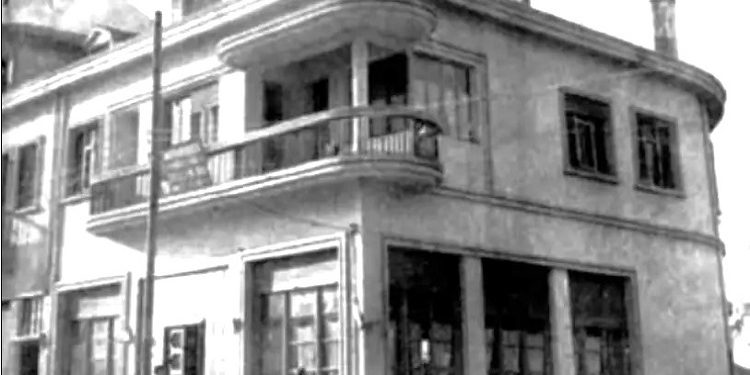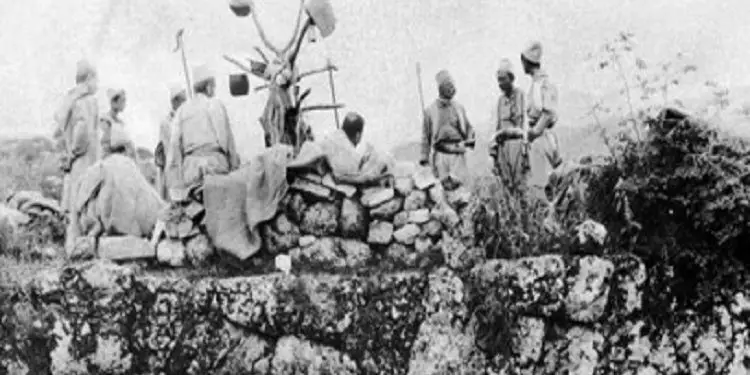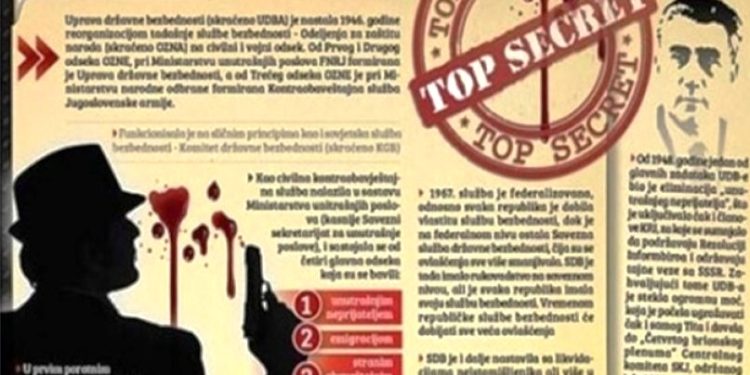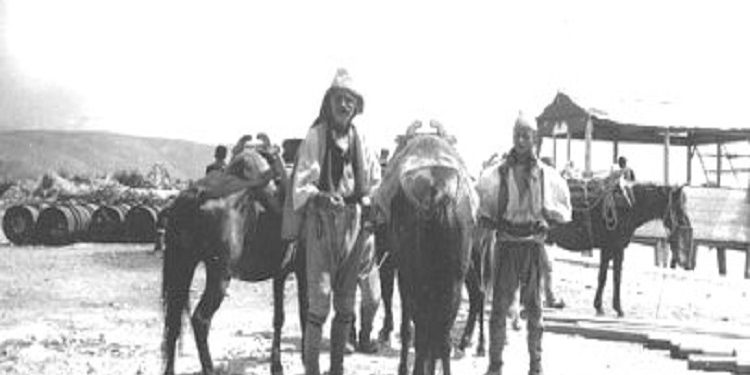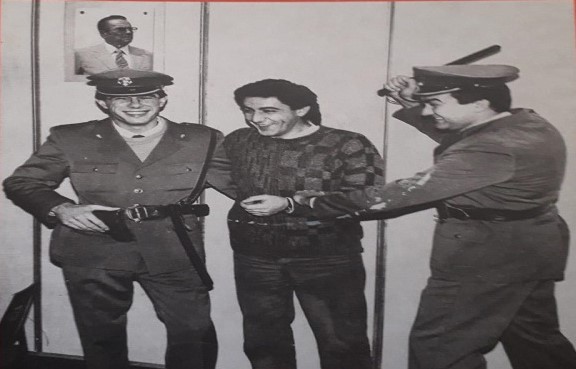By Nafi Çegrani
Part Two
Memorie.al / Since my youth, when I served as an operative officer in the Yugoslav SDB (State Security Service), in 1972, I felt a special sense of responsibility. It wasn’t just the job that obligated me to collect and analyze secret information; it was the feeling that every document, every secret report, constituted an important part of the history of my people. Every file marked with “Top Secret” was like a window into the past that few dared to open. At the time, I didn’t fully grasp its moral significance. But as months and years passed, as I read reports on political activities, persecutions, and violations of the rights of Albanians, I began to understand that history is made up not only of what we have experienced ourselves, but also of what must remain alive for future generations.
Continued from the previous issue
A specific incident stuck in my mind. In the years 1973–1974, after I had processed a detailed report on the violence and persecution of the Cham people, a chief superior called me into his office. He clearly told me that any publication of this data would lead to my “immediate loss of career and freedom.” It was a direct threat, but I felt that silence was not an option. My dignity and conscience told me that my duty was to document and recount the truth, even if it made me the object of pressure and fear.
In those moments, I learned that fear is a powerful tool of power, but an individual with a clear conscience and morality can overcome it. Every document I saved, every fact I analyzed, gave me the strength to stand firm. Another incident occurred when a report on the activities of Albanian intellectuals in Kosovo ended up in the hands of high-ranking UDB officials. I was threatened that this document could destroy my career and land me in prison. But for me, documenting the truth was not an act of rebellion; it was a moral and historical duty.
These personal experiences made me understand that courage is not the absence of fear, but the ability to act despite it. My case was not merely individual; it was symbolic for all those who, under pressure and threat, choose not to remain silent in the face of injustice. Every decision to write and document the truth was a step forward in defending human dignity and national identity.
Reflecting on these experiences taught me that the history of a nation is not just a chronicle of facts, but the result of the decisions of individuals who dare to stand for the truth. Fear may attempt to suppress an individual, but conscience and a human and historical mission are more powerful. Every document I kept, every report I analyzed, and every writing I decided to compile, was an oath not to allow the truth to be hidden by silence and fear.
As I summarize all the experiences, documents, and reflections I have shared, I understand that the history of the Albanian people cannot be separated from the history of Chameria and Kosovo. Both of these territories, through pain, persecution, and sacrifice, show that the identity and dignity of a nation are not easily extinguished. Every secret file I browsed, every report I analyzed, was a silent testament to the truth, but also a call for moral and historical action.
Chameria taught me about the painful losses, the occupation, and the ancient attempts to extinguish a people. Kosovo taught me about survival, about the silent struggle of Albanian intellectuals and citizens under the Titoist regime. Seeing these two histories clash with violence and silence, I understood that every Albanian has a responsibility towards the past, present, and future.
The role of the individual is crucial. He is not just a witness; he is the guardian of memory, the documenter of the truth, the keeper of hope. Murphy’s Law, which guided me throughout these years, is not a bureaucratic rule, but a moral principle: every righteous action to document, to write, and to preserve the truth turns into permanent wealth for humanity.
Through the archives, through the reports, and through my personal experience, I understood that fear can be powerful, but it cannot prevail over conscience and the need to act righteously. History is not written by silence, but by those who dare to tell the truth, regardless of the risks.
The message for future generations is clear: the diligence to write and preserve history is a moral and humanistic duty. Every document, every memory preserved, is a light that illuminates the truth. Future generations must learn that history is not just written in books, but also in the decisions of individuals who dare to stand for the justice and identity of their people.
And so, Chameria and Kosovo are not just territories; they are symbols of a fragmented nation, a history of survival, and a responsibility that never ends. The light of truth lies not only in documents but in the courage to write, to testify, and to remember. This is the covenant I leave to the generations: not to allow the truth to be hidden by silence, fear, or ignorance, but to keep it alive as part of the soul and history of the Albanian nation.
Since my youth, when I served as an operative officer in the Yugoslav SDB from 1972, I felt a special sense of responsibility. It wasn’t just the job that obligated me to collect and analyze secret information; it was the feeling that every document, every secret report, constituted an important part of the history of my people. Every file marked with “Top Secret” was like a window into the past that few dared to open.
At the time, I didn’t fully grasp the moral significance of this mission. But as months and years passed, as I read reports on the political activities, persecutions, and violations of the rights of Albanians, I began to understand that history is made up not only of what we have experienced ourselves, but also of what must be kept alive for future generations. History is a bridge connecting the past with the future, and I, although an ordinary operative officer, felt a part of it.
In the dusty archives, among the carefully numbered files, I found information about the fate of the Cham people, who lived under silence and occupation, but also about Kosovo, which was experiencing a strict Titoist regime. Every document was a secret history, a testimony that could not be allowed to fade into the darkness of bureaucracy.
As I analyzed them, my mind tried to connect the dots: a report on property confiscation, another on violations of minority rights, and another on fabricated arrests-all these together formed a painful, but also mandatory, picture for action.
The archives of the Yugoslav intelligence service were not merely a treasure trove of information; they were windows into the secret, from which one could view the hidden world of power and the people trying to survive. Every file was coded, sealed with signs signalling its danger and importance: “Top Secret,” “Internal Use,” or “Publication Not Allowed.” In the early years of my service, I felt like I was just a silent guardian of documents, but I quickly realized that every note, every report, carried historical weight.
Among the many files, I came across reports describing the situation in Chameria. These were operational notes on the expropriations of property, detentions, and the violence exerted by the Greek administration against the Cham Albanians. A 1944 report described the violent exodus of families, the burning of homes, and the confiscation of lands. Another report from 1950 described the remaining attempts to integrate economically and socially under occupation. Every sentence written there seemed dry, bureaucratic, but for me, it was a silent light of truth-a testimony of a pain that could not be extinguished.
Likewise, the archives contained reports on Kosovo, where the Titoist regime exerted strict control over the political and cultural life of Albanians. A 1971 file noted the surveillance of intellectuals who expressed views on the rights of Albanians and at least three cases of political arrests. Another report spoke of the infiltration of service agents into Albanian educational and cultural organizations, supervising every activity suspected of being “against the state order.”
Chameria, the silent place under occupation, always stayed in my mind as I browsed the archives. A 1944 report described the violent exodus of Cham families from their villages: burned homes, confiscated lands, and a systematic effort to extinguish the identity of a people.
Another 1951 report described the detention of young people trying to organize economically and educationally, and the surveillance of families who had remained. Every sentence I read pained me; these were not just statistics, but broken lives, extinguished hope, and histories that demanded to be heard.
In other files, I found reports on the attempts of Cham Albanians to preserve their traditions, language, and national identity. The Greek administration and local power structures saw these efforts as a threat, exerting daily controls and violence. A 1960 report noted: “Any cultural activity of Cham Albanians can be a source of instability. Must be kept under control, any attempt at national formation is forbidden.” These words, written on bureaucratic paper, were for me evidence of an injustice I could not ignore.
Kosovo, like Chameria, was a territory where history and violence clashed daily, but in a more sophisticated and controlled manner. A 1971 file described the surveillance of Albanian intellectuals who publicly expressed views on the rights of their people. The notes reported on secret meetings, critical expressions, and discussions in university settings, which the regime viewed as a threat to the state order. Some of them were arrested without a fair trial, faced fabricated processes, and were convicted for actions “against the state order.”
Another 1974 report described the infiltration of agents into Albanian cultural associations and educational organizations. Every activity related to the Albanian language, history, and culture was under constant surveillance. The documents showed that the regime used fear, blackmail, and threats to control every voice that sought to document the truth about the fate of Kosovo.
The role of the individual became increasingly clear. The archives taught me that survival was not just a physical matter, but a moral one too. Albanian intellectuals, teachers, scholars, and citizens fought to preserve their identity, to document the truth, and to transmit history, despite the threats. This silent struggle for survival was a continuation of the pain of Chameria and showed that the history of the Albanian nation could not be separated from both territories: one had remained occupied outside the borders, the other under the pressure of the regime.
During my years of service, there were moments when fear attempted to replace moral conviction. UDB chiefs often threatened me that any step towards publishing secrets could lead to severe consequences: closed prisons, isolation, and facing unprecedented repression. But as I looked at the files and documents on Chameria and Kosovo, I felt a duty that transcended personal fear- a call to act with dignity and responsibility.
A specific incident stuck in my mind. In the years 1973–1974, after I had processed a detailed report on the violence and persecution of the Cham people, a chief superior called me into his office and clearly told me that any publication of this data would lead to my “immediate loss of career and freedom…!” / Memorie.al
(Excerpt taken from Volume Two of the book ‘The Strategic Platform of the Albanian Nation,’ authored by Nafi Çegrani).




